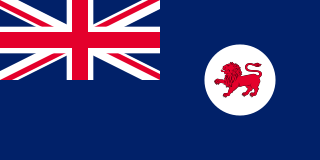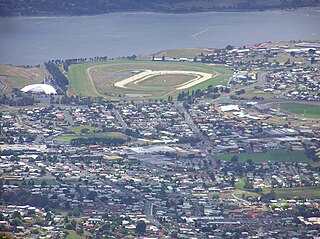Related Research Articles

John Edward Boulting and Roy Alfred Clarence Boulting, known collectively as the Boulting brothers, were English filmmakers and identical twins who became known for their series of satirical comedies in the 1950s and 1960s. They produced many of their films through their own production company, Charter Film Productions, which they founded in 1937.

Tasmania is an island state of Australia. It is located 240 kilometres to the south of the Australian mainland, and is separated from it by the Bass Strait. The state encompasses the main island of Tasmania, the 26th-largest island in the world, and the surrounding 1000 islands. It is Australia's smallest and least populous state, with 573,479 residents as of June 2023. The state capital and largest city is Hobart, with around 40% of the population living in the Greater Hobart area. Tasmania is the most decentralised state in Australia, with the lowest proportion of its residents living within its capital city.

The Tasmanian Devil, commonly referred to as Taz, is an animated cartoon character featured in the Warner Bros. Looney Tunes and Merrie Melodies series of cartoons. Though the character appeared in only five shorts before Warner Bros. Cartoons shut down in 1964, marketing and television appearances later propelled Taz to new popularity in the 1990s.

Glenorchy is a suburb of Hobart, Tasmania, Australia. Glenorchy is bound by the River Derwent to the east, Mount Wellington to the west, Hobart City to the south and Brighton to the north. The city officially begins at Creek Road New Town, in Hobart's northern suburbs, and includes, Moonah, Derwent Park, Lutana, Goodwood, Montrose, Rosetta, Berriedale, Chigwell, Claremont and Austins Ferry. It is the seat of the local government area of the same name, the City of Glenorchy.

The Gordon River is a major perennial river located in the central highlands, south-west, and western regions of Tasmania, Australia.
Olegas Truchanas was a Lithuanian-Australian conservationist and nature photographer.
Harold Norman Holgate AO was an Australian politician. He was premier of Tasmania from 1981 to 1982, serving as state leader of the Australian Labor Party (ALP) during that period. He succeeded Doug Lowe as party leader and premier during internal conflict over the Franklin Dam controversy, leading the ALP to defeat at the 1982 state election just over six months after taking office.

The Glenorchy District Football Club is an Australian rules football club currently playing in the Tasmanian State League and the Southern Football League in Tasmania, Australia.

The Australian Institute of Architects, officially the Royal Australian Institute of Architects, is Australia's professional body for architects. Its members use the post-nominals FRAIA (Fellow), ARAIA and RAIA. The Institute supports 14,000 members across Australia, including 550 Australian members who are based in architectural roles across 40 countries outside Australia. SONA is the national student-membership body of the Australian Institute of Architects. EmAGN represents architectural professionals within 15 years of graduation, as part of the Australian Institute of Architects.
John Whitefoord Heyer was an Australian documentary filmmaker, who is often described as the father of Australian documentary film.
Film Australia was a company established by the Government of Australia to produce films about Australia in 1973. Its predecessors were the Cinema and Photographic Branch (1913–38), the Australian National Film Board, and the Commonwealth Film Unit (1956–72). Film Australia became Film Australia Limited in 1988 and was consolidated into Screen Australia in 2008.
This is a list of members of the Tasmanian House of Assembly between the 1893 election and the 1897 election.
Front Line is a 1979 Australian documentary film directed by David Bradbury.
Lee Robinson was an Australian producer, director and screenwriter who was Australia's most prolific filmmaker of the 1950s and part of the creative team that produced the late 1960s international hit television series Skippy the Bush Kangaroo.
Cecil William Holmes was a New Zealand-born film director and writer.
Cable News Network Films is a motion picture division of CNN under Warner Bros. Pictures, originally launched in 2012. Its first film, Girl Rising premiered in spring 2013 in the United States.
Blood Brothers is a 1993 four-part Australian documentary film series that tells the stories of three different Aboriginal Australian men, and an Aboriginal ceremony.
Smith & Nasht is an Australian media production company formed by serial entrepreneur Dick Smith and filmmaker Simon Nasht. The company was established in 2010 and has specialised in "global issue" films. As of 2019, topics have included energy, climate change, science, natural history, over-population and cybercrime. Smith&Nasht's first film – I Can Change Your Mind About Climate – aired on Australian Broadcasting Corporation (ABC) television in 2012 and was followed by a high rating episode of the TV discussion show, Q&A.
Jonathon Roy Duniam is an Australian politician. He is a member of the Liberal Party and has served as a Senator for Tasmania since the 2016 federal election. He served as an assistant minister in the Morrison government from 2019 until May 2022, following the appointment of the Albanese ministry. Prior to entering parliament Duniam was a political staffer, including as deputy chief of staff to Tasmanian premier Will Hodgman.
References
- ↑ Tasmanian Government Film Unit; Norman Laird; Max Graham (1957), Hard to windward , retrieved 18 May 2023
- ↑ Tasmanian Government Film Unit; Norman Laird; Max Graham (1957), Title No: 16239 , retrieved 26 May 2023
- ↑ "Winners & Nominees".